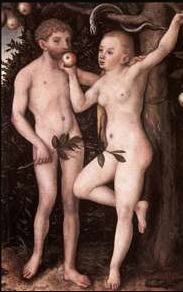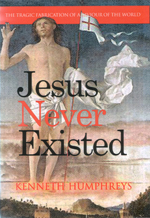He who has ears
Let him hear!
5-minute enlightenment
for those in a hurry
Prime cause?
"Avoid foolish genealogies ... for they are unprofitable and useless."
– Titus 3.9.
The Genealogy of Jesus – Matthew's edit
| Matthew 1 The scroll of lineage of Jesus Christ, son of David son of Abraham: 1 Abraham 5 and Judah begat Perez and Zarah by Tamar, 15 And David begat Solomon by the wife of Uriah. Therefore all the generations from Abraham until David are fourteen generations, and from David until the Babylonian exile are fourteen generations, and from the Babylonian exile until the Christ are fourteen generations. |
**
"Those who affirm him to have been a man, and to have been anointed by election, and then to have become Christ, appear to me to speak more plausibly than you who hold those opinions which you express."
– Trypho to Justin, Dialogue with Trypho, XLIX.
David's mighty brood
As a man of many wives, David fathered many sons. Born to him in Hebron: Amnon, Daniel, Absalom, Adonijah, Shephatiah, Ithream. Born to him in Jerusalem: Shammua, Shobab, Nathan, Solomon, Ibhar, Elishua, Eliphelet, Nogah, Nepheg, Japhia, Elishama, Eliada and Eliphelet – 19 sons in all, excluding those "sons by his concubines" and Tamar their (only?) sister.
If just one of David's sons Solomon really had "700 wives and 300 concubines" (1 Kings 11.3) just about every Jew alive would be of Davidic ancestry!
Matthew's "Scarlet Women"
Defenders of the faith love to prattle on about the inclusion of four disreputable women in Matthew's genealogy.
Tamar was a Canaanite and one-day prostitute who seduced her father-in-law in order to get pregnant. It was her right, don't you know? Result was Perez, an ancestor of David.(Genesis 38)
Rahab was a Canaanite and career prostitute who betrayed her people to the enemy. She saved her own skin and "dwelt in the midst of Israel." Result was Boaz, great grandfather of David (Joshua 2).
Note that only Matthew says that Rahab was the mother of Boaz. Earlier sources say simply that Salmon was his father. If Rahab really was a contemporary of Joshua (at the time of the fall of Jericho) and married Salmon, only four generations cover the 460 years to the birth of David!
Ruth was a widow who left her native Moab to live in Bethlehem, where her mother-in-law encouraged her to seduce a relative – Boaz (the son of Rahab). Result was Obed, the grandfather of David. (Ruth).
Bathsheba, probably a Hittite, was seduced by King David who subsequently had her husband murdered. Result was Solomon, the great emperor himself! (2 Samuel).
The point of all this? To remind listeners that the royal house of Israel itself sprung from whores.
Kinda makes an unwed virgin getting pregnant par for the course.
Genealogies in the Old Testament
Genesis 4:17-22 (descendants of Cain, down to Tubalcain)
Genesis 5:1-32 (descendants of Adam, down to Noah's three sons)
Genesis 10:1-32 (descendants of Noah; the “Table of Nations”)
Genesis 11:10-26 (descendants of Shem, down to Abram and his brothers)
Genesis 25:12-16 (twelve sons of Ishmael; the “Ishmaelites”)
Genesis 35:22b-26 (twelve sons of Jacob; the “Israelites”)
Genesis 36:1-43 (descendants of Esau: the “Edomites”)
Genesis 46:8-27 (Jacob’s sons & grandsons in Egypt)
Exodus 6:14-27 (descendants of Reuben, Simeon, and esp. Levi, the priestly tribe, down to Moses, Aaron, and Phineas)
Numbers 3:1-2 (sons of Aaron; first generations of priests)
Numbers 3:17-20 (sons of Levi; main classes of Levites)
Ruth 4:18-22 (descendants of Perez, down to David)
1 Chronicles 1:1—9:4 (Adam to Saul’s descendents)
The genealogies found in Genesis provide a necessary link between the six days of divine creation, the descendents of Noah after the Flood, and the foundation narratives of Abraham and the Patriarchs. The sacred tale continues through the books of Exodus, Joshua and Judges into the Davidic age. It is a faux history for a prehistoric era. In a later and less fabulous time genealogies retained their importance. A noble ancestry strengthened the claims of a ruler and was useful to those who aspired to power. A purported ancient lineage legitimized priestly and regal authority, gave justification to vast disparities of wealth, and was the basis on which placement and precedence in political and temple hierarchies were assigned. The Jews were far from unique in this reverence for bloodlines. Greeks and Romans, too, had noble houses claiming descent from heroic, even divine progenitors. Julius Caesar, for example, claimed descent from the goddess Venus. The priestly aristocracy of the Jews, however, stressed above all else divinely ordained racial purity. Theirs was a religious duty to preserve the bloodline of the chosen people from the pollution of alien seed – and that alien might live only a few miles from Jerusalem. According to Deuteronomy 23.3, Moabites – people on the eastern shore of the Dead Sea – were to be excluded from the community of Israel “even to the tenth generation", a prescript which, if enforced, would have excluded King David himself, a great-grandchild of the Moabite Ruth! But if the social and priestly elites jealously guarded and judiciously redacted their ancestral scrolls, the common people had no such heirlooms. Illiterate peasants and artisans, especially those in obscure hamlets far from Jerusalem, had no such genealogies and it's doubtful if any could recall ancestors farther back than a few generations, assuming they even knew who was their father. Whence, then, does a lowly carpenter from Galilee, acquire a genealogy tracing his descent from the very beginning of the human race?
A humble carpenter with a 3500-year pedigree? All the grandees from Adam to Noah lived for several centuries, most of them more than 900 years! Collectively, these fabulous creatures account for 1,500 years of antediluvian "history". So long-lived were they that Adam and eight subsequent generations were simultaneously alive even into the time of Lamech, the father of Noah. This unsurpassed nonsense is the earliest part of the genealogy of Jesus – at least according to the gospel known to the world as Luke. Of course, Jesus had no human father in the normal sense of the word. The Hebrew God himself is named as the father, with the Holy Spirit taking on the role of divine semen. We know this because Luke records that the angel Gabriel told Mary "you will conceive in your womb ... The Holy Spirit will come upon you, and the power of the Most High will overshadow you." (Luke 1.31,35). A divine parentage – a commonplace of ancient mythologies – might be perceived as accolade enough but in the case of the Galilean carpenter a second superlative ancestry was asserted. Jesus was also, it seems, a scion of the royal house of David, the fabled dynasty that established – and lost – an ancient empire, the existence of which none but the Jews noticed. But what of the time before the evangelist wrote his wondrous tale? Luke built on the work of his predecessors.
The first gospel Mark had nothing to offer in terms of Jesus genealogy – beyond, that is, the generic terms Son of Man and Son of God. Mark does not even record the name of Jesus' father. For Mark, Jesus was a righteous man, adopted by God at baptism. His human descent was not relevant and his family were discarded (Mark 3.31-35). A blind man, Bar Timaeus, does appeal to Jesus as a "son of David" (see below) but Mark's Jesus positively rejects any suggestion that he is of Davidic descent by having his hero quote Psalm 110 ("Jehovah said to my Lord: `Sit at my right hand, till I make your enemies your footstool' "). Jesus points to the simple logic that an ancestor cannot also be a descendant: "Then Jesus said ... “How is it that the scribes say that the Christ is the Son of David? David himself calls Him ‘Lord’. How then is He his son?" – Mark 12.35-37.
Matthew is the first to introduce ancestry into the Jesus story and the writer has a Jewish, not a universal, audience in mind. As a preface to his nativity yarn of wise men, infanticide and a star, Matthew ties his Jesus to the Hebrew patriarchs and begins his lineage for Jesus with Abraham, the father of the Hebrew nation. For his "generations" down to the 6th century BC Persian client king Zerubbabel, Matthew mines the books of Genesis and Chronicles but he is manifestly using the Septuagint (LXX), the Greek translation of Hebrew scripture. So much for Papias and the supposed "Aramaic original" of Matthew! Matthew is determined to present his hero as the "fulfillment of Jewish prophecy," and not as an adored but newfangled guru. A key part of Matthew's design is to show that Jesus does indeed issue from the royal line of David. The anointing of a king, certainly in the case of David, symbolized the descent upon him of the holy spirit and his "messiahship" (he was the "anointed of God" and hence, in Greek, the christos).
After all, if Joseph was not the actual father of Jesus what precisely was the value of the genealogy of Joseph? Did a godman whose descent supposedly passed through all the patriarchs and King David really need a second line by adoption? Only later will conception by the Holy Ghost be intruded into this Jesus story, making the lineage of Joseph redundant. For Matthew it is Joseph, not Mary, who receives divine guidance. On no fewer than four occasions angels visit Joseph's dreams. The birth of Jesus itself is almost an aside, the story moving quickly on, with warnings and flights to and from Egypt.
Matthew is not overly concerned with "accuracy" in his genealogy but with the religious symbolism of numbers. He organizes his "king list" into three sets of fourteen to derive a total of 42 generations. But why? The answer is to be found in Hebrew gematria. King David's name (דוד) equals fourteen (D = four, V= six, D= four) and fourteen itself is double the "spiritual perfection" of seven. Thus the very fabric of Jewish history, read through the lens of magic numbers, can be shown to point towards the coming of Christ. The first set of fourteen is consummated with the reign of David himself and up to this point Matthew closely follows Chronicles. The second set of fourteen – the Davidic royal line through Solomon – ends at a low point, with Jeconiah (aka Jehoiachin). This forlorn character is taken into Babylonian exile and remains there for thirty-six years. But in order to maintain his numerical symbolism Matthew has to omit several kings along the way. Thus, between 9th century king Jehoram and 8th century Uzziah Matthew skips Ahaziah (aka Jehoahaz), Johoash and Amaziah. Having reached number fourteen, Matthew then says:
The "royal line of David" was not remembered history but an invention of the priestly elite at the court of the child king Josiah. Its purpose was to legitimize Judah's ambition to conquer the north, taken by the Assyrians eighty years earlier. There was no possibility that Josiah could actually trace his lineage back centuries to the legendary ancestor. The genealogy was court propaganda. But though the lineage could never be proved, as a tenet of holy scripture neither could it be contested. Unfortunately, God reneged on the contract: about the age of thirty, Josiah was killed by Necho II of Egypt. Josiah's first son was Jehoahaz, who ruled for three months before being deposed by the Egyptians. In his stead, the pharaoh installed his brother Jehoiakim (aka Eliakim) who ruled for eleven years and (according to 2 Kings) died during the first assault on Jerusalem by the Babylonians. It was Jehoiakim's son and Josiah's grandson Jeconiah who surrendered the city and went into exile. Thus Matthew has simplified history and made a grandson into a son. Matthew then goes on to omit a genuine son of Josiah and Jeconiah's uncle – Zedekiah (aka Mattaniah) – who ruled Judah from 597 to 587. It was Zedekiah's rebellion against his Babylonian overlord that led to the second assault on Jerusalem by Nebuchadnezzar and the destruction of the city and its temple. Brought before the Great King, Zedekiah witnessed the execution of his sons, was blinded and then deported to Babylon. Thus ended the line of the kings of Judah. Even God added to the woes of the house of David with a curse on Jeconiah (well, at least according to the prophet Jeremiah):
After the Kings of Judah The last set of fourteen names in the Jesus pedigree is the most problematic – and arguably the most pertinent for the veracity of the "historical Jesus". It covers five hundred years of wars, conquests and destructions from which even the Jewish prophets cannot assemble a cogent chronology. Matthew needs to pick up the Davidic trail from Babylon. It is a time of Judean subjugation by the new superpower Persia. But Matthew's sources are conflicting. According to the book of Ezra the "Prince of Judah" was now Sheshbazzar:
Is Sheshbazzar an alternative name for Zerubbabel? Not according to Ezra 5 which makes clear they are distinct characters. Is Sheshbazzar, perhaps, a son of Jechonias, the last king of independent Judah? According to Chronicles the descendants of "Jehoiachin the captive"(Jechonias) were "Shealtiel (Salathiel) his son, Malkiram, Pedaiah, Shenazzar, Jekamiah, Hoshama and Nedabiah". But the same text goes on to list Zerubbabel not as the son of Shealtiel but of Pedaiah, his brother. (1 Chronicles 3.17-18). Thus we have three possible routes for the "Davidic line": Jechonias through Sheshbazzar; Jechonias through Shealtiel then Zerubbabel; and Jechonias through his brother Pedaiah then Zerubbabel. Ezra provides yet a fourth option. The scribe lists the families that had returned from exile:
Luke will later add yet another twist: Shealtiel's father was not Jechonias after all but an unknown man named Neri! Matthew again simplifies all this in the interests of his holy master plan.
Matthew agrees with Chronicles that Salathiel was the father of Zerubbabel but has different ideas as to where the sacred bloodline goes next. Chronicles rather fully details:
But it gets worse! Ahead lies a five-hundred year period of Persian, Greek, Ptolemaic, Seleucid, Hasmonaean, Herodian and Roman rule. Yet aside from the stories of Ezra and Nehemiah set in the 5th century BC, until the 2nd century BC nothing is known of the "Davidic line". The changes of regime during this half millennium are seismic and include the rise of two non-Davidic dynasties – the Maccabees and the Herodians. Because of the frequent revolutions there are serious gaps in the historical record. Temple scrolls, even the temple itself, were destroyed more than once. Clearly, this obliges the evangelist to rely on "divine inspiration" and in Matthew's gospel, descent from Zerubbabel, through Abiud, to Joseph now passes through a series of otherwise unknown names. But for such a long period of time – with its multiple devastations – a mere fourteen names is woefully inadequate, less than three names per century! But there is a further difficulty. Matthew says there are fourteen generations from the Babylonian exile until the Christ but, bizarrely, the writer has lost count: he lists only thirteen names. Matthew’s genealogy of 42 generations, in the event, turns out to be only 41 generations! At length we arrive at "And Jacob begat Joseph ... " A later writer, Luke, found the efforts of Matthew less than adequate to the noble purpose and set about a drastic revision.
Part 2 - The Genealogy of Luke's Gospel
Sources:
'Save' a friend e-mail this page
Copyright © 2010
by Kenneth Humphreys.
|
||||||||||||||||||||||||||||||||||||||||||||||||||||||||||||||||||||||||||||||




